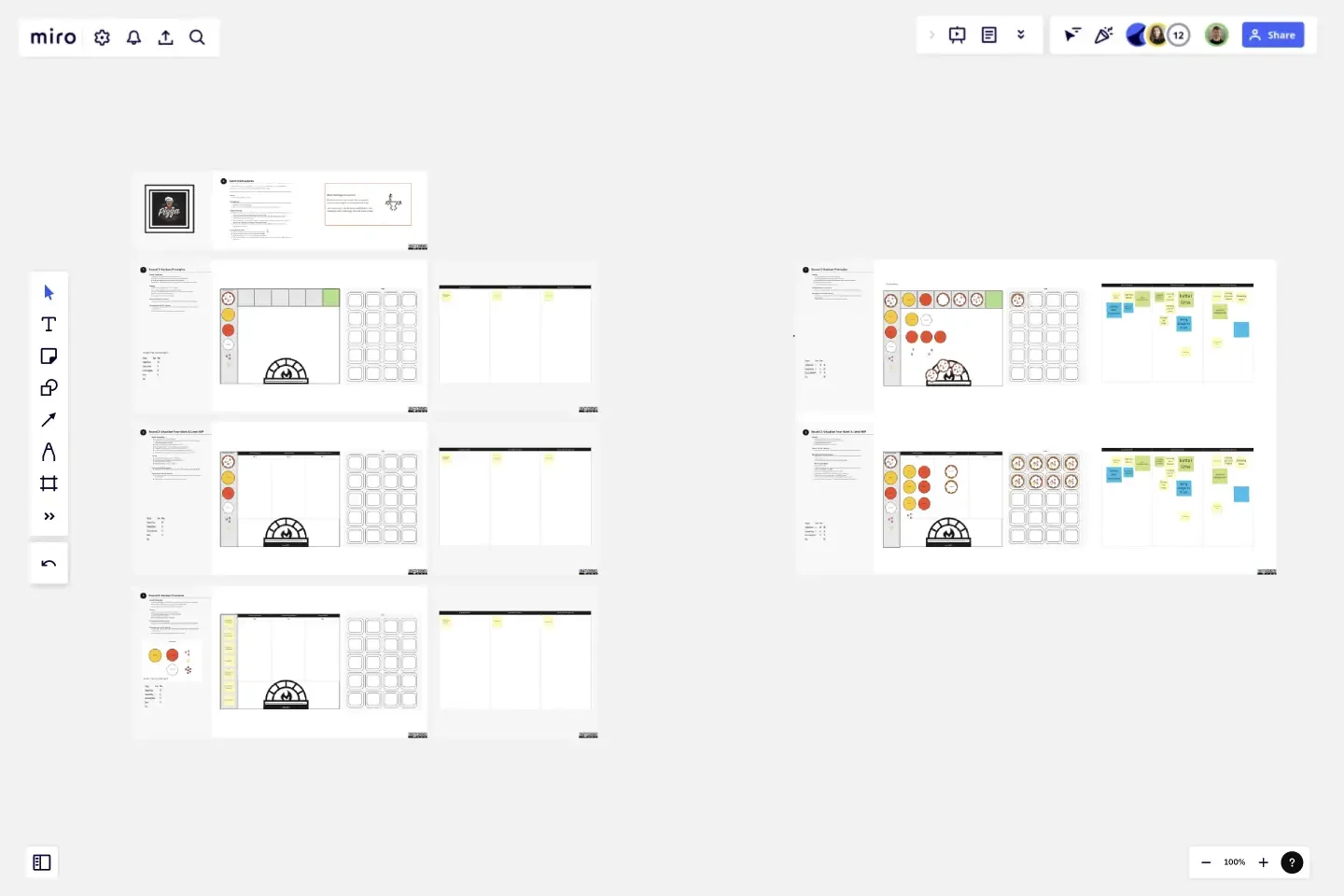Kanban Pizza Game
If you want to understand the kanban principles and practices in fun and engaging way then the kanban pizza game is for you!
This lean-agile coaching tool is the perfect virtual template to teach individuals and teams the basics of a kanban system. Teams are guided through 3 iterations, each one adopts more of the practices until the end when teams bring it all together.
The mechanics of the game are simple, you're a team of pizza chefs and it's your job to make the most pizzas you can as a team without creating waste. Apply WIP limits and roles to manage your flow and create pizza orders for your customers.
Play as a single team or compete with multiple teams and copy as many boards as you need to facilitate this fun learning session.
This template was created by Flowana.
Get started with this template right now.
STATIK Canvas
Works best for:
Agile, Kanban
STATIK Canvas template provides a structured framework for implementing Kanban methodology within teams. By focusing on understanding, shaping, and sharing knowledge, this template facilitates continuous improvement and alignment with organizational goals. Teams can visualize their workflow, identify improvement opportunities, and implement changes iteratively to achieve higher efficiency and effectiveness in their processes.
Retrospective in the Island of Golocans
Works best for:
Retrospectives, Meetings, Agile Methodology
The Retrospective in the Island of Golocans template offers a creative and imaginative setting for retrospectives, transporting participants to a fictional island setting. It provides elements for reflecting on past iterations, sharing insights, and brainstorming improvements. This template enables teams to step outside their usual environment and approach retrospectives with a fresh perspective. By promoting creativity and storytelling, the Retrospective in the Island of Golocans empowers teams to engage in meaningful discussions, generate new ideas, and foster a culture of innovation effectively.
Scrum Puzzle
Works best for:
Agile
The Scrum Puzzle is a collaborative activity that reinforces Scrum roles, artifacts, and ceremonies. By assembling a puzzle representing the Scrum framework, teams gain a deeper understanding of its components and how they interrelate. This template offers a fun and interactive way to reinforce Scrum knowledge and promote team alignment, empowering practitioners to apply Scrum principles effectively and deliver value with agility.
Funding Tracker Template
Works best for:
Kanban Boards, Operations
For many organizations, especially non-profits, funding is their lifeblood—and meeting fundraising goals is a crucial part of carrying out their mission. A funding tracker gives them a powerful, easy-to-use tool for measuring their progress and staying on course. And beyond helping you visualize milestones, this template will give you an effective way to inspire the public to donate, and help you keep track of those donors. It’s especially useful when you have multiple donations coming from a variety of sources.
Design Sprint Kit Template
Works best for:
Agile Methodology, UX Design, Sprint Planning
With the right focused and strategic approach, five days is all it takes to address your biggest product challenges. That’s the thinking behind Design Sprint methodology. Created by Tanya Junell of Blue Label Labs, this Design Sprint Kit provides a set of lightweight templates that support the Design Sprint’s collaborative activities and voting—and maintains the energy, team spirit, and momentum that was sparked in the session. Virtual sprint supplies and prepared whiteboards make this kit especially useful for remote Design Sprint Facilitators.
Features Prioritization Tool
Works best for:
Agile
The Features Prioritization Tool offers a systematic approach to prioritizing product features based on criteria such as value, effort, and strategic alignment. It provides a structured framework for capturing, evaluating, and ranking feature ideas, enabling teams to make informed decisions about what to build next. With customizable scoring mechanisms and visual dashboards, this template empowers product teams to optimize their product roadmap and deliver maximum value to customers, driving competitiveness and market success.
